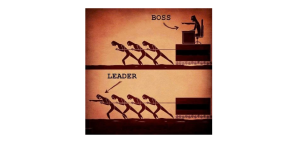#Leadership : 6 Habits Of Trustworthy Leaders…The People in your Office May Not Trust you as Much as you Think they Do. Here’s How to Win them Over.
Consulting firm EY released its Global Generations 3.0 research which found that less than half of full-time workers between the ages of 19 and 68 place a “great deal of trust” in their employer, boss, or colleagues. Another recent survey from Globoforce’s WorkHuman Research Institute found that 80% of employees trust their colleagues, but only 65% trust senior leaders in their companies.
That’s a problem. EY’s research also found that low levels of trust majorly influences employees to look for another job (42%), work the minimum number of hours required (30%), and be less engaged and productive (28%).
“People are forgiving if they know that their leaders—particularly their senior leaders—are trying,” he says. “If they know that their senior leaders are being straight with them and they have [fusion_builder_container hundred_percent=”yes” overflow=”visible”][fusion_builder_row][fusion_builder_column type=”1_1″ background_position=”left top” background_color=”” border_size=”” border_color=”” border_style=”solid” spacing=”yes” background_image=”” background_repeat=”no-repeat” padding=”” margin_top=”0px” margin_bottom=”0px” class=”” id=”” animation_type=”” animation_speed=”0.3″ animation_direction=”left” hide_on_mobile=”no” center_content=”no” min_height=”none”][the employees’] as well as the company’s best interest in mind, they’re more likely to trust.”
Earning the trust of your team has real bottom-line benefits, says Dennis Reina, cofounder of Reina, a trust-building consultancy and author ofRebuilding Trust in the Workplace: Seven Steps to Renew Confidence, Commitment and Energy. He points to one of his clients: an airline with a troubled operations team. Lack of trust, marked by infighting and poor communication, was making the team ineffective. In a year, Reina’s team raised the level of trust in the department by 51 points, according to a post-test they did. The department saved $1 million in strategic planning costs because they were able to work well together and cut the planning time down to one-third of previous requirements, he says.
There are a number of simple, straightforward actions that build trust, Reina says. Here are six simple tactics that work.
KEEP YOUR AGREEMENTS
Few actions ruin your trustworthiness faster than breaking your word, Reina says. Doing what you say you’re going to do reinforces the perception of your character. If circumstances change and you’re unable to do so, explain why with as much detail and context as possible so all parties understand the reason for the change. When you’re consistent with your word, people know they can depend on you.
Like this Article ? Share It ! You now can easily enjoy/follow/share Today our Award Winning Articles/Blogs with Now Over 2.5 Million Growing Participates Worldwide in our various Social Media formats below:
FSC LinkedIn Network: (Over 15K+ Members & Growing !) www.linkedin.com/in/frankfsc/en
Facebook: (over 12K) http://www.facebook.com/pages/First-Sun-Consulting-LLC-Outplacement-Services/213542315355343?sk=wall
- Google+: (over 800K)https://plus.google.com/115673713231115398101/posts?hl=en
- Twitter: Follow us @ firstsunllc
educate/collaborate/network….Look forward to your Participation !
Continue of article:
GIVE CONTEXT
Leaders are often counseled to give specific direction and communicate clearly, but context is also important, Reina says. When people understand why you’re asking them to take on a difficult challenge or a task they’d rather not do, help them understand the importance of what you’re asking. Seeing how their role fits into a bigger picture and is valued helps them understand and trust the organizational vision, which can help foster greater trust in both the company and its leaders. Plus, transparent cultures are good for business.
BE PRESENT
When you’re interacting with your team members, pay attention and focus on the conversations and dynamics, says Tara A. Goodfellow, managing director of Athena Educational Consultants, Inc. Listen to what matters to your employees and let them know that you are actually hearing and considering what they’re saying. If you’re distracted or unfocused, you risk making them feel like you’re insincere, which will erode trust.
“If you don’t get to know your employees and what motivates them, it’s really hard to build that trust,” she says.
WELCOME DIVERSITY
Leaders and organizations that welcome varied input and feedback are more trustworthy. The EY study found that 38% of respondents say that a diverse environment is a “very important” determinant of trust. In this context, diverse environment means that it “strives to recruit, retain, and promote diverse people with all differences including gender, country of origin, and thinking style,” according to the survey results.
BE HUMAN
You’re going to make mistakes and there are going to be things you don’t know, so ask questions, admit when you’re wrong, and, when appropriate, make amends, says Timothy G. Wiedman, a former corporate manager and associate professor of management and human resources at Doane University. By showing a measure of vulnerability and willingness to admit when you’re wrong or need help shows that you’re human and helps people more easily relate to you, he says.
“A question that should have been asked—but wasn’t—may have catastrophic consequences that will not soon be forgotten,” he says. But when people know that you’re willing to get the answers you need instead of faking it, they’ll trust you more, he says.
HAVE THEIR BACKS
Employees will trust you most when they feel you’re looking out for them, Reina says. Encourage feedback—even when it’s difficult to hear—and create an environment where they feel secure. When they are having challenges at work, provide the support, training, or resources they need to improve. And if they’re facing an unfair or otherwise disruptive situation, go to bat for them to make it right.
“People are forgiving if they know that their leaders—particularly their senior leaders—are trying,” he says. “If they know that their senior leaders are being straight with them and they have [the employees’] as well as the company’s best interest in mind, they’re more likely to trust.”
FastCompany.com | GWEN MORAN | 09.19.16 5:18 AM
[/fusion_builder_column][/fusion_builder_row][/fusion_builder_container]

